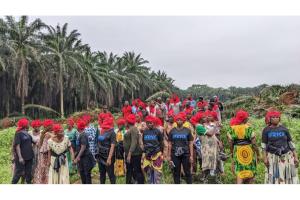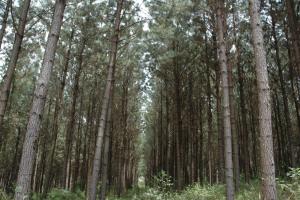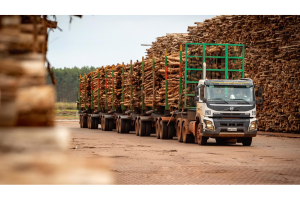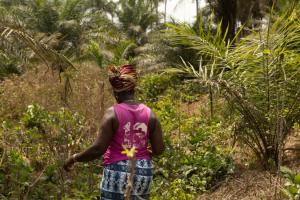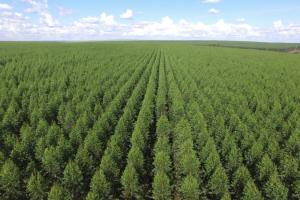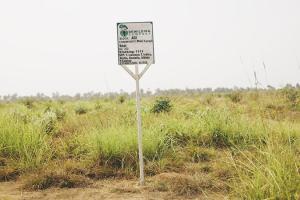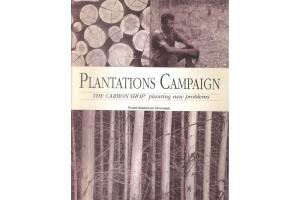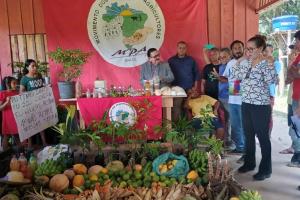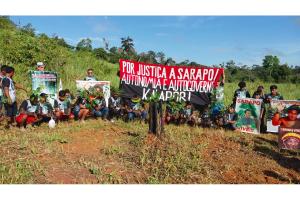Press release. SOCAPALM, a subsidiary of Socfin, must immediately cease replanting operations at Edea 1, in Cameroon.
Large-Scale Tree Plantations
Industrial tree plantations are large-scale, intensively managed, even-aged monocultures, involving vast areas of fertile land under the control of plantation companies. Management of plantations involves the use of huge amounts of water as well as agrochemicals—which harm humans, and plants and animals in the plantations and surrounding areas.
Bulletin articles
28 June 2024
A new round of initiatives to plant tree plantation to provide carbon offsets is currently being proposed. Aside from the absurd notion—endorsed by the UN and various national governments—that tree plantations can offset the (climate) damage caused by burning fossil carbon, these initiatives have destroyed people's livelihoods and co-opted vast areas of community land.
Bulletin articles
28 June 2024
Forest conservation and tree planting initiatives to provide carbon offsets are two of the corporate sector's favourite ways to greenwash their image and keep doing business as usual. These initiatives have features that make them very attractive to investors, for example the easiness with which project arguments and calculations can be manipulated. Therefore, it is no surprise that scandals have come to light—which has affected the kinds of projects being developed.
Bulletin articles
28 June 2024
How many tree plantations are there, and how big are they? In what regions and countries are they located? What are the differences among the various "players" who are directly involved in implementing tree plantations for the carbon market? This article presents figures and information seeking to answer these and other questions.
Bulletin articles
27 June 2024
Behind every tree plantation developed for carbon offsets, there are external agents seeking to profit from increased control over the land. And while they all have the same colonial approach, these plantations can vary widely: they can be large-scale monocultures or schemes with smallholder farmers; they can include exotic species or native species; and some of them may even exist on paper only.
Bulletin articles
27 June 2024
Several initiatives have done their part in promoting tree plantations for carbon offsets. Regardless of whether these initiatives are led by the corporate sector, NGOs, national governments, or oil companies, polluting corporations benefit from the diversion of attention away from the need to curb fossil fuel emissions.
Other information
27 June 2024
An investigation shows that While companies like the Swedish fast food chain Max Burgers AB sells ‘carbon neutral’ burgers, a carbon offset project in Uganda is pushing families into hunger.
Other information
27 June 2024
A report documents how a tree planting carbon project in Port Loko, Sierra Leone is violating the country’s community rights laws and risks locking families into 50-year contracts. The British oil company BP has already paid USD 2.5 million to Carbon Done Right, one of the companies behind this tree plantation and carbon offset project.
Bulletin articles
27 June 2024
We recommend rereading the publication, “The Carbon Market: Planting More Problems,” written by Larry Lohmann in 2000.
Articles
12 June 2024
São famílias da Comunidade de Virgílio Serrão Sacramento no município de Moju (estado do Pará, Brasil) que coletivamente somam forças desde o final de 2015 quando reocuparam o território conhecido pela ação dos grileiros, no qual já fizeram várias vítimas. Desde então, o Acampamento ocupa sua terra com moradias, plantações, produção e fornecimento de alimentos.
Articles
24 May 2024
Once again the Ka’apor people, through their ancestral organization TUXA TA PAME, has demonstrated its strength, on May 12, 13 and 14. They denounce the atrocities that Indigenous Peoples and quilombola and peasant traditional communities suffer in the hands large-scale landowners, loggers, mining corporations, gold diggers, carbon credit speculators and the agribusiness sector.
Articles
10 May 2024
The president of the Tshopo provincial assembly supports the call of international NGOs demanding to pause a mediation process between the oil palm company PHC and communities affected by its oil palm plantations. Since 2018, the mediation has not addressed the communities’ demand for investigation of the (il)legality of the concessions at the basis of the companies palm oil business but has led to increased the violence and put community rights at the plantation sites in Lokutu and Boteka, in neighbouring Equateur province, at risk.
